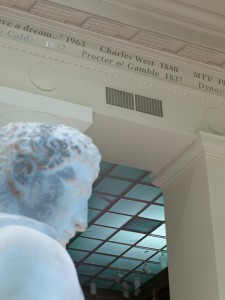- Events & Programs Home
- Calendar
- Accessibility
- Adults
-
Families & Teens
- Families & Teens Home
- 10x10 Teen Art Expo
- Art on the Rise
- Art Together: Art Making for Families with Children Ages 3–5
- Babies Sing with May Festival Minis
- Boy Scouts / Girl Scouts
- CAM Kids Day
- Family Storytime and Gallery Walk
- Family Studio: Art Making for Families with Children Ages 6–12
- Games in the Galleries
- Members-Only Baby Tours
- Public Baby Tours
- REC Reads
- Rosenthal Education Center (REC)
- Saturday Morning Art Class
- See Play Learn Kits
- Summer Camp
- Teen Fest: Zine and Comic Exchange
- RECreate
- Teachers
- Community Outreach
- Fundraisers
- Plan Your Own Event

- Events & Programs Home
- Calendar
- Accessibility
- Adults
-
Families & Teens
- Families & Teens Home
- 10x10 Teen Art Expo
- Art on the Rise
- Art Together: Art Making for Families with Children Ages 3–5
- Babies Sing with May Festival Minis
- Boy Scouts / Girl Scouts
- CAM Kids Day
- Family Storytime and Gallery Walk
- Family Studio: Art Making for Families with Children Ages 6–12
- Games in the Galleries
- Members-Only Baby Tours
- Public Baby Tours
- REC Reads
- Rosenthal Education Center (REC)
- Saturday Morning Art Class
- See Play Learn Kits
- Summer Camp
- Teen Fest: Zine and Comic Exchange
- RECreate
- Teachers
- Community Outreach
- Fundraisers
- Plan Your Own Event
Blog: CAM Uncovered
Blog: CAM Uncovered
- Home
- Plan Your Visit
- Art
-
Events & Programs
- Events & Programs Home
- Calendar
- Accessibility
- Adults
-
Families & Teens
- Families & Teens Home
- 10x10 Teen Art Expo
- Art on the Rise
- Art Together: Art Making for Families with Children Ages 3–5
- Babies Sing with May Festival Minis
- Boy Scouts / Girl Scouts
- CAM Kids Day
- Family Storytime and Gallery Walk
- Family Studio: Art Making for Families with Children Ages 6–12
- Games in the Galleries
- Members-Only Baby Tours
- Public Baby Tours
- REC Reads
- Rosenthal Education Center (REC)
- Saturday Morning Art Class
- See Play Learn Kits
- Summer Camp
- Teen Fest: Zine and Comic Exchange
- RECreate
- Teachers
- Community Outreach
- Fundraisers
- Plan Your Own Event
- Give & Join
- About
- Tickets
- Calendar
- Exhibitions
- Collections
- Blog
- Shop
Art Museum of the 22nd Century
by Emily Holtrop
11/2/2011
Emily Holtrop , learning & interpretation , museum history , Felix Gonzalez Torres , education

Recently, I had a great conversation with a docent, volunteer museum educator, about all the interesting and profound moments in history that have taken place during the 130 years that the Cincinnati Art Museum has been open to the public. Now, these conversations don’t normally just happen, as much as folks from outside the museum world would like to think they do. We were standing in the front lobby waiting for a tour group to arrive and we starting talking about Felix Gonzalez Torres’ work Untitled (Portrait of the Cincinnati Art Museum). If you are not familiar with the work, look up the next time you visit, it encircles the front lobby and tells the story of the Art Museum in words, dates and historical events. It is amazing to think that the Art Museum has been open through World Wars, the turning of two centuries, and the election of nineteen presidents. It is almost mind boggling.
 This notion of history and the Art Museum’s place in it prompted our discussion question for the week – The Art Museum of the 22nd Century, What does it look like to you? What will the Cincinnati Art Museum look, sound, feel like in 2111? What is our future? Will we arrive for our visit in flying cars; will we all have microchips in our heads that will upload information on works on view right to our brains. What new works will be in the collection from this century? Will these works continue to tell our story, our history?
This notion of history and the Art Museum’s place in it prompted our discussion question for the week – The Art Museum of the 22nd Century, What does it look like to you? What will the Cincinnati Art Museum look, sound, feel like in 2111? What is our future? Will we arrive for our visit in flying cars; will we all have microchips in our heads that will upload information on works on view right to our brains. What new works will be in the collection from this century? Will these works continue to tell our story, our history?
A recent article on ARTINFO.com, discusses just this issue, the collection of items from today for the museum goers of tomorrow. The article talks about how the Smithsonian American History Museum and the New York Historical Society are collecting ephemera from the Occupy Wall Street protests. That they are racing to preserve this moment in history for future generations, to, in essence, tell our story for museum visitors of the 22ndcentury. This story reminded me of my previous life in Miami, Florida as a museum educator for the Historical Museum of Southern Florida and the Caribbean (now History Miami). From 2000-2002, I taught Miamians their history and was there to witness firsthand the contentious 2000 presidential election. Yes, I voted on the butterfly ballot and yes, I was in the epicentre of the dangling chad. So how does this relate to the story in ARTINFO? Just like the Smithsonian and NY Historical Society, HMSF raced to collect ballots, pregnant and dangling chads included, for the collection so that visitors from the next century learned the story of this one.
While many may think that museums only look to the past, the future of museums and where we are going is actually a hot topic in the museum world. Every Thursday afternoon the American Association of Museums sends out a weekly e-blast from their Center for the Future of Museums titled Dispatches from the Future of Museums. This is a very popular email in the Division of Learning and Interpretation and I can always tell when a member of my staff has opened it and started reading. Some of the best conversations in our office about what we do, why we do it and how we can do it differently come out of something from this weekly email.
It is also makes you wonder if museum staffers from 130 years ago were sitting in this same building thinking about what the Art Museum of 2011 would look, sound, and feel like.
Emily Holtrop – Director of Learning & Interpretatio
Cincinnati, OH 45202
Toll Free: 1 (877) 472-4226
Museum Hours
Museum Shop
Terrace Café
Library
Cincinnati Art Museum is supported by the tens of thousands of people who give generously to the annual ArtsWave Campaign, the region's primary source for arts funding.

Free general admission to the Cincinnati Art Museum is made possible by a gift from the Rosenthal Family Foundation. Exhibition pricing may vary. Parking at the Cincinnati Art Museum is free.
Generous support for our extended Thursday hours is provided by Art Bridges Foundation’s Access for All program.

General operating support provided by:



